British Steel: What is happening?
- Published
- comments
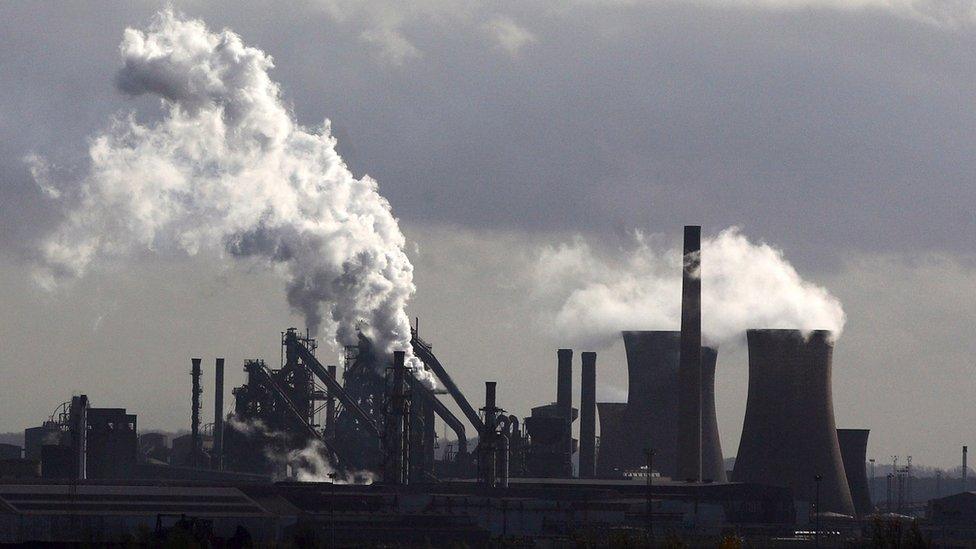
The British Steel Steelworks in Scunthorpe is at risk of closing
A company called British Steel is at risk of closing, after control of the company has been taken from the owners, Greybull. As a result, 5,000 people's jobs are directly at risk.
It has happened after the steel company has been struggling to make enough money.
The government had been talking to Greybull to try to rescue the situation, save the business and stop the company from having to close.
But talks have broken down and, now, the Government's Official Receiver has taken control of the company off Greybull.
This is part of a process called liquidation, which could end in the steelworks' closure, if those now in control of British Steel are unable to find a solution.
When a company goes into liquidation, the business has to close. It does this by bringing together anything of value that it has left and settling as many debts as it can.
At the moment, the jobs of around 3,000 people who work at the company's main site in Scunthorpe are at risk, plus 2,000 jobs at other sites.
The British Steel site is hugely important to the local area of Scunthorpe. If it closes, it will have a knock-on effect on other people and businesses, like local cafes. It is estimated that a further 20,000 people could be affected if British Steel is forced to close.
Some people who live in Scunthorpe have said the closure of the plant would leave Scunthorpe a "ghost town".
Read on to find out more about the situation.
Read a report from March 2016
What is British Steel?
British Steel is a big company that manufactures steel in the UK. It is the UK's second-biggest steel maker.
Its main plant is at Scunthorpe, but it also has sites in Teesside, Cumbria and North Yorkshire.
It is hugely important to the local area of Scunthorpe, giving jobs to thousands of people in the area and helping to sustain the local economy.
It is a privately owned company, but some people think that it should be nationalised, which means it would be owned by the public instead.
One of British Steel's biggest customers is Network Rail, which buys 95% of their rails for train lines from British Steel's Scunthorpe site.
Steels are a large family of metals and the industry to produce it forms an important part of the UK economy.
Buildings, clothes, chemicals, cars, lamps or drinks cans all need steel at some point to be made.
Why is British Steel in trouble?
Two issues have been named as key factors in British Steel's current struggles - money and Brexit.
External issues like the trade war between the US and China has also been referenced as playing a part in the company's problems.
1) Money
Explained simply, the company doesn't have enough money to keep going.
Last month, it had to borrow £100m from the UK government to pay an EU carbon emissions bill in order to avoid paying a steep fine.
The pound sterling - the UK's currency - has also not been performing very strongly in financial markets ever since the UK voted to leave the EU, which has been named as another factor in British Steel's issues.
2) Brexit
The company's problems have been linked to a decline in orders from European customers because people haven't been sure what is going on with Brexit.
A steel worker told the BBC that it wasn't a surprise the company was in trouble because there has been lots of finished steel on the floor of the factories with no customers to sell it to.
"We're doing a bit at work, but it's mostly sitting around doing nothing as the orders just aren't there," he said.
Reports suggest the company had at one point been trying to secure £75 million in extra support from the government to help it to address "Brexit-related issues", but that this number was later lowered to £30 million.
Is this a new problem?
This is far from the first time that the British steel industry has faced problems.
High UK energy prices, too much steel being produced, other countries selling steel for cheaper, and climate change rules have all played a part in making life tough for the steel industry over the last few decades.
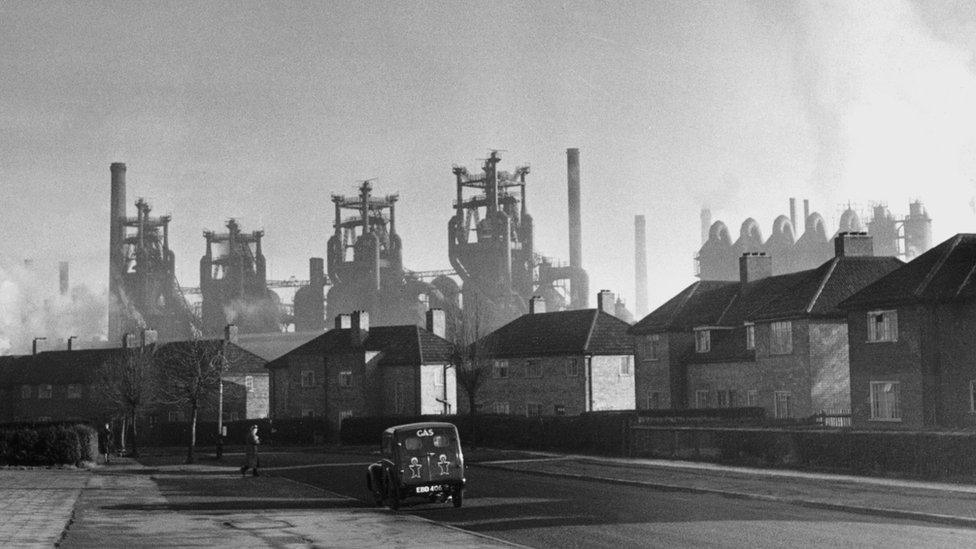
This picture from around 1950 shows the Corby steelworks in Northamptonshire
In the early 1980s, the Corby steelworks in Northamptonshire closed and around 11,000 people lost their jobs. As a result, three out of 10 people in the town could not find work.
The same happened in Scotland when the Ravenscraig Steelworks was closed in 1992 and eventually knocked down.
Steel was extremely important in post-war Europe. In fact, the EU actually started its life as a group called 'the European Coal and Steel Community'
In October 2015, a steelworks plant called Redcar in north-east England was forced to close, which left just two main steelworks sites in the UK - Port Talbot in Wales and the Scunthorpe plant in England.
Both of these were owned by a company called Tata Steel, which had entered the UK steel market in 2007. But just a few months later, crisis hit the steel industry once more.
In January 2016, Tata Steel - which at the time employed 15,000 people in the UK - announced more than 1,000 job cuts, including 750 at its Port Talbot site in Wales. It had already got rid of 1,200 jobs in October 2015 and 720 the summer before.
Lots of children in Port Talbot have parents who work at the steel plant
It then announced that it wanted to sell its UK factories.
The Scunthorpe plant was sold to an investment group called Greybull for £1. This saved more than 4,000 jobs. Greybull became the new owners of the Scunthorpe plant and they renamed it British Steel. But now, control of this company has been removed from Greybull, and British Steel's future is uncertain yet again.
The Port Talbot site continues to operate.
What are British Steel's options?
1. Find a buyer
The next step is for the people now controlling the company to try to find someone who wants to buy it in order to rescue the business.
Roy Rickhuss, who works for a special organisation which helps people who work in the steel industry, said: "There continues to be hope both for steelmaking at Scunthorpe and for its [other] operations. What is needed is the right ownership."
While the search goes on for a new owner, British Steel will continue to do business normally.
2. Nationalisation
Labour's shadow business secretary Rebecca Long Bailey is one of the people who wants the company to become nationalised and passed into public ownership.
"The government must act quickly to save this strategically important industry and the livelihoods and communities of those who work in it, by bringing British Steel into public ownership," she said.
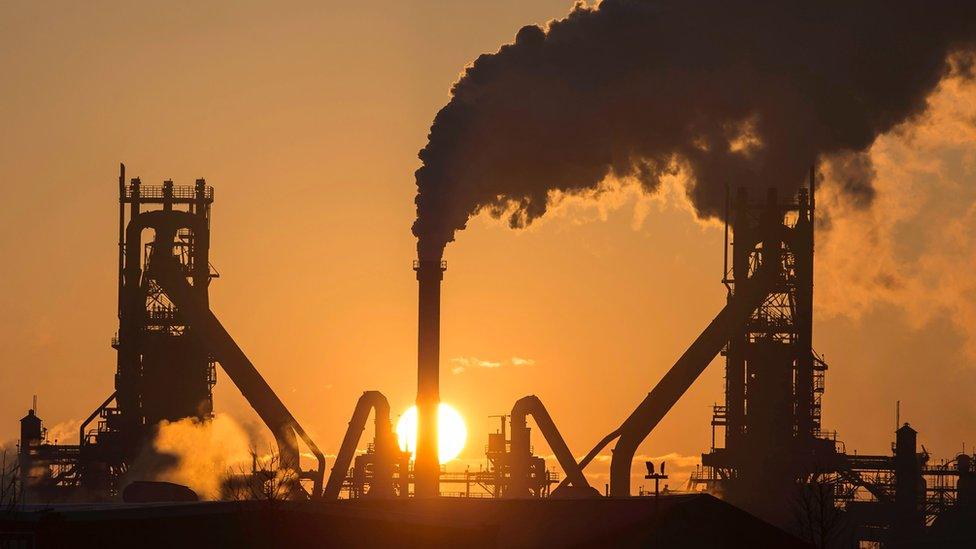
This picture shows the sun rising above the blast furnaces at the Scunthorpe Plant when it was owned by Tata Steel
But it has been reported that Treasury sources say the only way that nationalisation would be considered is if there were other buyers set up, but this will be a challenge to find, given the issues the company faces.
3. Financial help
Some have said they hope the government will step in and help to keep the company going, but people have voiced concerns that this won't happen.
"Our only hope is a government bailout, but this time it feels different. I don't think they'll save us," said one steel worker.
It also might make people angry if the government gives millions of pounds of taxpayers' money to a private company in order to help it out.
4. Close down
If those controlling the company can't find someone to buy it, and none of the options above will work, then the company will be liquidated, meaning that it will be closed down.
Anything worth selling will be sold in order to cover the company's debts, and people will have to find somewhere else to work.
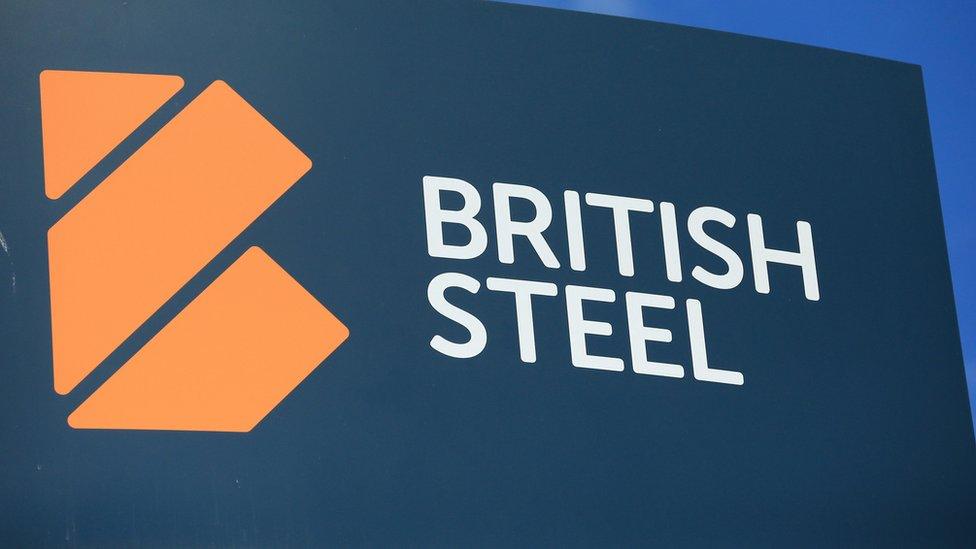
Thousands of people are waiting to see what will happen to British Steel
So what is going to happen?
For now, people are waiting to see what will happen next.
David Phillip Patinson - a 55-year-old who owns a garage in the area near the steelworks - said he was "60% positive" that the company would be rescued. He said that closing a 150-year-old manufacturing giant meant Scunthorpe is "finished".
"They've been in this position before in the past and they've always managed to scrape through," he said. "The steelworks is the backbone of Scunthorpe. It's the only thing that keeps this town going and without that, I don't know what'll happen."
UK Steel's director general Gareth Stace says: "We have every confidence that the government is investigating every available opportunity and pulling out all the stops to ensure a viable solution is found. We stand ready to work with the government to help it deliver this."
- Published13 October 2015
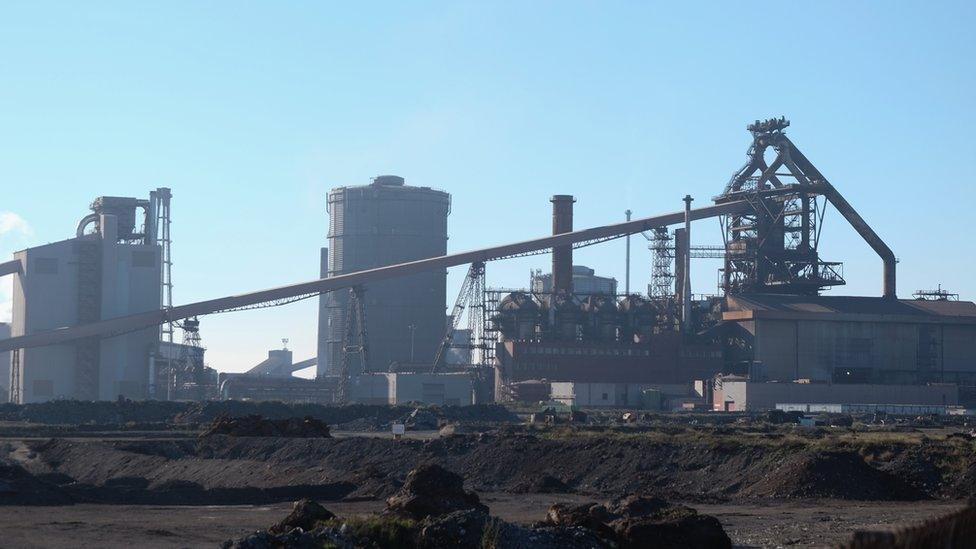
- Published13 October 2015
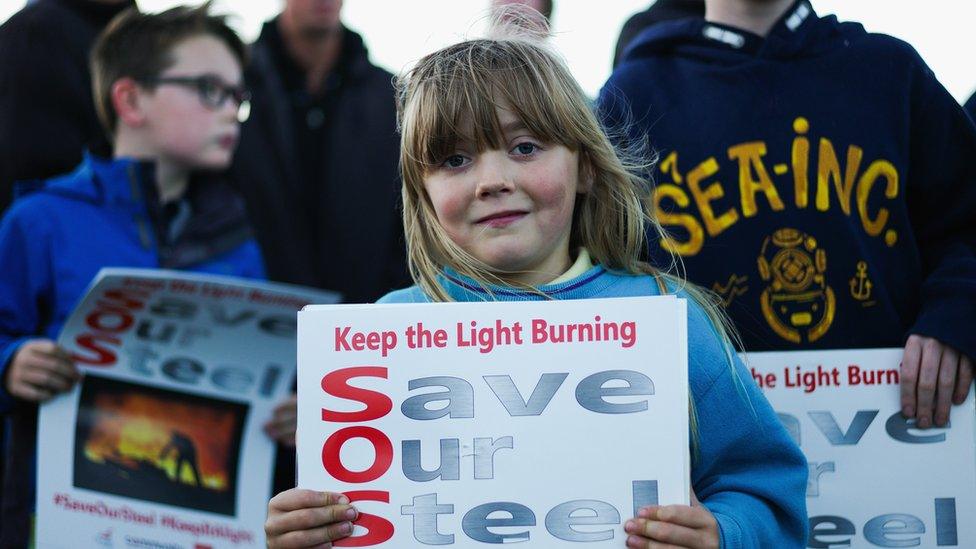
- Published21 January 2016

